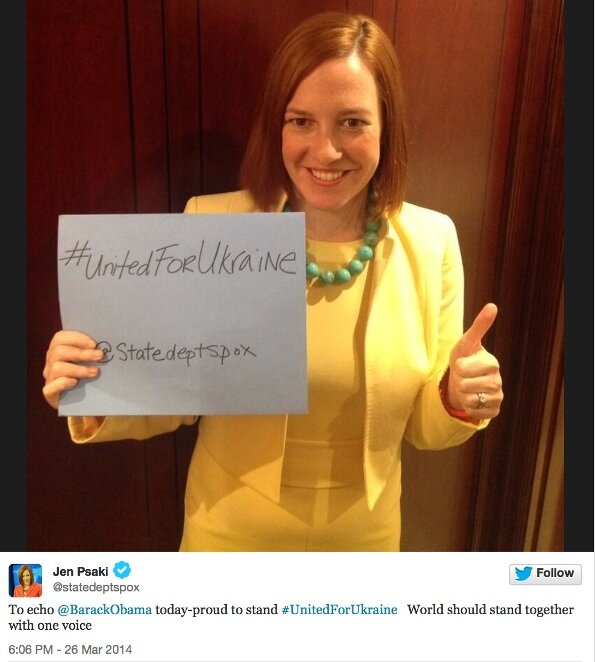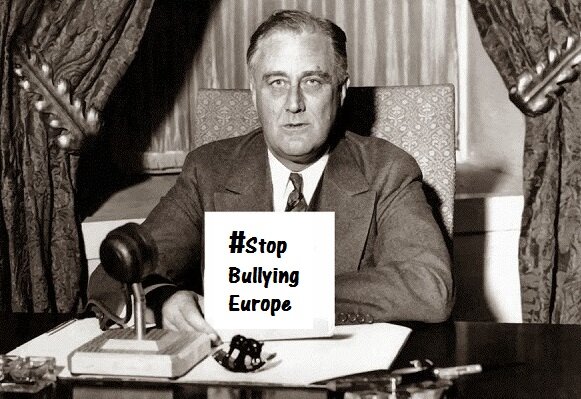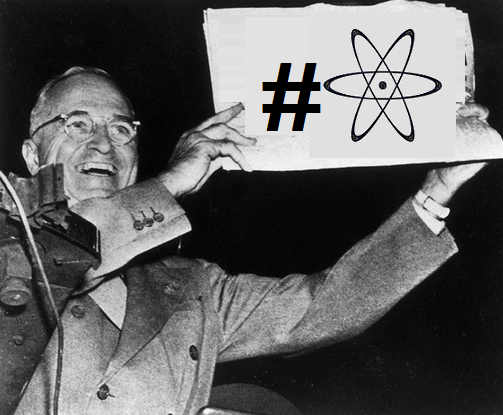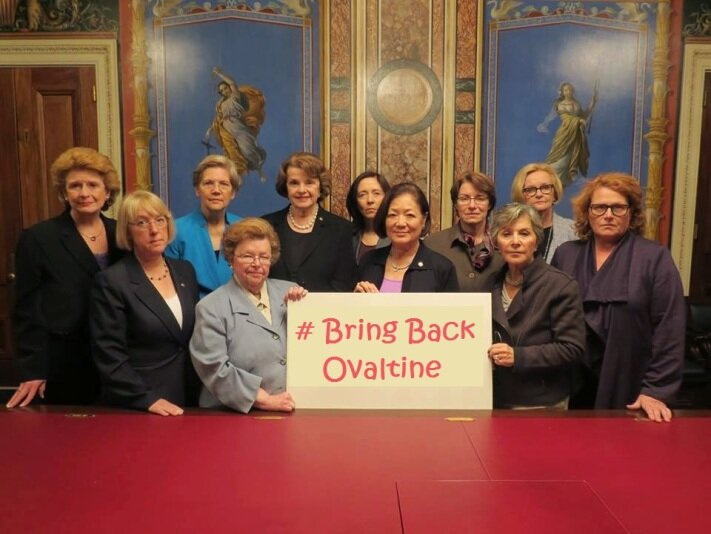I've been following the news over the last couple days of the striking advance of the Islamic State of Iraq and the Sham (ISIS) in northwestern Iraq. By some estimates they now control fully one third of the country and are dangerously close to Baghdad. Time will tell if they're capable of holding their recent gains in the face of what will hopefully be a robust Iraqi response, but the situation in both Mosul and Tikrit in recent days looks very grim.
I was initially going to write a blog post noting the failure of our cut-and-run strategy in Iraq, focusing on the meme, popular with people on the left during the last decade who'd never actually been to Iraq, that American soldiers were a destabilizing influence in the country. But as soon as I started my research I came across a piece which not only states that meme, but displays along with it such a staggering combination of stupidity and ignorance that I couldn't let it go without comment.
The piece appears today in Salon and is written by gentleman named Tom Engelhardt. I'd never heard of him, but he runs a website named TomDispatch.com, is a fellow of The Nation Institute, a Teaching Fellow at the Graduate School of Journalism at Berkeley, and is, from what I can tell, a pacifist of sorts.
I can understand a pacifist. As a libertarian leaning conservative, I understand the desire to avoid government persuasion at the barrel of a gun. But I also understand that there are bad people out there who want to do really bad things and if I have a choice between an armed and an unarmed good person, I know which one I'm going to go with every time.
Getting to the meat of Mr. Engelhardt's argument, he lays out "five straightforward lessons...drawn from the last half century":
"1. No matter how you define American-style war or its goals, it doesn't work. Ever.
2. No matter how you pose the problems of our world, it doesn't solve them. Never.
3. No matter how often you cite the use of military force to "stabilize" or "protect" or "liberate" countries or regions, it is a destabilizing force.
4. No matter how regularly you praise the American way of war and its "warriors," the U.S. military is incapable of winning its wars.
5. No matter how often American presidents claim that the U.S. military is "the finest fighting force in history," the evidence is in: it isn't."
There is so much wrong with each of these 'lessons' I'll only be able to scratch the surface in this post. But before I start I want to try to understand Mr. Engelhardt's thought process a little better. I think it can be illustrated by this passage, "but keep in mind that we are inside an enormous propaganda machine of militarism, even if we barely acknowledge the space in our lives that it fills. Inside it, only certain opinions, certain thoughts, are acceptable, or even in some sense possible."
I wonder if those citizens of Mosul or Tikrit who are still alive today realize that they're really just inside a propaganda machine of militarism. But I digress.
Mr. Engelhardt is against war - all war - which in Berkeley I would imagine is a safe opinion to have. ISIS isn't lying in wait a few miles away with designs on the city. The problem with his logic is that a "propaganda machine" can't produce ISIS' recent atrocities, nor could it conjure out of thin air Putin's land grab, nor could it blow up airports in Pakistan or take two hundred innocent children hostage in Nigeria. People do these things. Turns out the only propaganda we'll see is from Mr. Engelhardt.
"Nomatter how you define American-style war or its goals, it doesn't work. Ever."
In supporting this claim, Mr. Engelhardt reverts to the tried and true leftist meme that Bush created more terrorists after 9/11. As his first bit of evidence, he cites a WSJ article which reports that "between 2010 and 2013 alone, jihadist groups grew by58%, their fighters doubled, and their attacks nearly tripled." Which would be all well and good except the man who wrote that op-ed and the RAND report it cites actually argues the opposite point, that our disengagement from Iraq and our pending disengagement from Afghanistan have emboldened these jihadist groups and swelled their ranks. Perhaps Mr. Engelhardt hopes his readers don't actually subscribe to the Journal and won't read that part of the piece.
He then tries to use America's disengagement from Iraq as evidence of our failure to pacify the country. Here he - along with many of the partisans on the left - makes a fundamental mistake. To the extent Iraq is "lost", it is so because we left. We didn't leave because we lost. If the US military lost anything, it was the political support necessary to see the mission through. That loss of support can be laid directly at the feet of people like Mr. Engelhardt who make arguments like these.
"American-style wars don't solve problems."
Earlier in the piece Mr. Endelhardt says these are lessons drawn from the last half-century, but uses only examples from the last few years to support this claim. First he repeats his claim that we create more terrorists than we kill. Then he cites the fake hepatitis B vaccination operation the CIA conducted in an effort to gain intelligence on bin Laden, saying that perhaps 100,000 cases of polio will result (yes, you read that correct). Putting aside the fact that one of the citations he uses in support of these claims says "Taliban opposition to vaccination campaigns predates the bin Laden raid", and the fact that the preponderance of anti-vaxxers in this country are on the left these days, Mr. Engelhardt really isn't making any kind of coherent argument here.
America's liberation of Kuwait didn't solve any problems? Operations in Grenada or Panama solved nothing whatsoever? Taking down the Taliban in Afghanistan and Saddam Hussein in Iraq were useless? Preventing North Korea from invading the south again was a waste of time? Fighting the Cold War contributed nothing to the human condition on the planet? What about Bosnia in the 90s? Mr. Engelhardt has quite a few questions to answer before he can claim that American-style wars (whatever that means - he likely can't define it himself) don't solve problems.
"American-style war is a destabilizing force."
Mr. Engelhardt started off horribly, but here he goes off into Alec Baldwin Batcrap Crazy territory. The American military has been, over the course of the last 100 years, the single greatest force for stability and progress the world has ever seen. From WWI on, wherever we have extended our security umbrella peace and prosperity have followed. Dr. Thomas PM Barnett (a Democrat) has proven this point pretty conclusively but you don't need to read his books, you just need to look at a satellite image of the Korean peninsula at night. Only where we've taken it away, as in Iraq and soon in Afghanistan, have we seen destabilization. Mr. Engelhardt could perhaps be forgiven for thinking Iraq was a peaceful country filled with gumdrops and butterflies before 2003, or that Afghanistan was a model of progress and prosperity under the Taliban, but as critics of the United States military often do, he only has a problem with America using force. Saddam, the Taliban, Boko Haram, Putin, etc., are all absolved of guilt. Their actions mean nothing. The thinking goes something like this: Al Qaeda (or insert any other group here) wouldn't exist if we weren't assholes in the first place. On second thought I should probably apologize to Alec Baldwin, I'm not sure even he is this crazy.
"The US military can't win it's wars."
Mr. Engelhardt says this is so obvious it shouldn't need to be explained, "Korea, Vietnam, Afghanistan and Iraq ranged from stalemate to defeat and disaster." He's full on into revisionist history here. And silly revisionist history at that. Was Korea a stalemate because we successfully beat back North Korea's attempt to annex the south and returned the boundaries to where they were at the start of the war? Were not Saddam and the Taliban ousted in Iraq and Afghanistan? If Mr. Engelhardt wants to see an example of a superpower being defeated in Afghanistan he needs to look no farther than the 1980s and the Soviet Union. I promise it looks nothing like Afghanistan today. He also conveniently leaves the 1991 Gulf War out of this argument because it doesn't fit his narrative.
But I would argue that Mr. Engelhardt does have a point, although it's likely not the one he intended.
We could have declared victory early on in both Iraq and Afghanistan and brought our men and women home for good. Why didn't we? Because as a nation we care about what happens in each of those places once we're gone and wanted to give them the best chance to thrive after taking out their oppressive regimes. In both places we risked our initial military victories to chase longer term political ones. We didn't have to do that. Likewise, ISIS and the Taliban and Boko Haram can use the political mechanisms in their respective countries to bring about social change, but they choose to murder, rape and pillage instead. With nary a peep from people like Mr. Engelhardt.
"No matter how often American presidents claim that the U.S. military is "the finest fighting force in history," the evidence is in: it isn't."
I can't actually fault Mr. Engelhardt for this claim. If he's stupid enough to believe he's proven his first four claims then this one logically has to follow. He actually gives up trying to prove his point here, which is fine with me because I find it hard to believe I made it through his first four attempts.
In the final paragraphs Mr. Engelhardt tells the reader that "peace" is the answer. We should pour billions into planning for peace.
Ok.
In pursuance of that goal I think Mr. Engelhardt should work with the Peace Studies departments of al Qaeda, ISIS, the Taliban, Boko Haram, and/or any of the dozens of other jihadi groups which have sprung up around the world. Let's really get a grass roots peace movement going. The suicide bomber who killed and wounded dozens in Sadr City yesterday just wanted peace and freedom after all. And isn't it perfectly obvious that all of the beheadings reported in Mosul today were done out of love? They're just all caught up in the propaganda machine of militarism, they don't know any better. Mr. Engelhardt could help.
I wished we all lived on this fantasy planet, but unfortunately there are bad men in the world who do very bad things. And almost none of them are members of the United States military.





 Tom Weiss
Tom Weiss Michael Sheldon
Michael Sheldon Site
Site Stephen McDonald
Stephen McDonald David Churchill Barrow
David Churchill Barrow Todd Seavey
Todd Seavey Erich Forschler
Erich Forschler